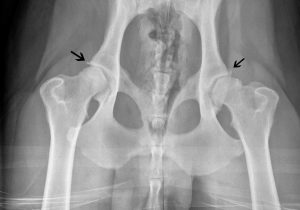Most people think of collagen as an anti-aging product. You’ll find collagen in cosmetic products and in supplements because it’s the elastic protein that holds skin together.
As we age, the amount and quality of collagen in our bodies starts to diminish. That’s why we can see our skin begin to wrinkle and sag.
Collagen is also found in the joints and connective tissues of the body. In fact, collagen makes up 70 to 90% of our:
- Muscles
- Tendons
- Ligaments and other joint supporting tissues
When collagen breaks down in the body it can cause …
- The joints to become less stable
- The muscles and connective tissue loosen and become more brittle
We also see disorders such as …
- Arthritis
- Degenerative disc disease
- Tendonitis
The same is true of collagen in your dog. And this is when you can see overuse injuries start to happen.
Vaccinated dogs developed auto-antibodies to their own collagen
Is it any coincidence that even severe cases of hip dysplasia are not seen before eight weeks of age … the age at which most puppies are vaccinated?
READ MORE…
VLA COMMENT: Let’s pretend this is an animal study for human beings. That being said…how many people do you know have hip or knee replacement surgery. Could it be that vaccines in the human population is also causing antibodies to collagen?
A Veterinary First: Treatment for Arthritis Pain
By Dr. Karen Becker (associate of Dr. Mercola as it pertains to pets)
It’s estimated that 14 million dogs and 90% of cats over age 12 in the US suffer from osteoarthritis, which can affect their quality of life. This recent FDA approval of a treatment for osteoarthritis pain may be a game changer for many pets in distress.
Secondary OA, on the other hand, can have a wide range of causes, including trauma, abnormal wear and tear on the joints and cartilage or an inherited defect present at birth such as hip dysplasia in dogs.
